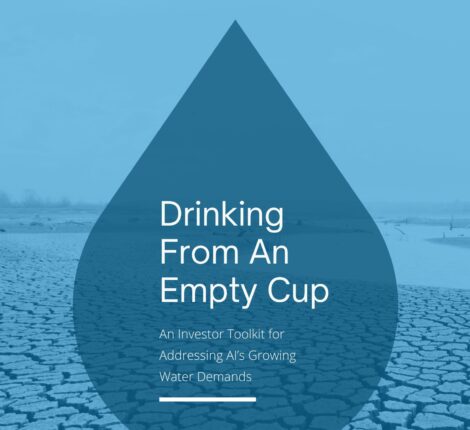Our CEO’s Q4 2023 Letter to Clients
January 30, 2024 Fourth Quarter
Our View
Trying to make sense of the world feels like a fool’s errand, an impossible task, an uphill battle. It’s all so confusing, so complicated, and so complex. Is it human nature to seek answers and solutions? Probably. But what if there is no single, simple, yes or no answer? We seem to crave binary solutions rather than embracing multiple and often conflicting realities. This shows up everywhere—are you for Israel or Palestine? For or against funding Ukraine? Building a wall? Will the market go up or down? Thumbs up or thumbs down? It goes on and on while polarization increases, gaps widen, critical thinking suffers, and complexity is ignored or, even worse, demeaned.
As we enter this election year, it seems like a good time to remind ourselves of the gray, perhaps beginning with remembering some of the positives. Americans voted to preserve abortion rights in Kentucky and Ohio in last November’s elections. The Inflation Reduction Act of 2022 continues to incentivize reshoring of manufacturing and investments in renewable infrastructure. Closer to home, we are excited about the continued progress we are making in the context of our five pillars: racial and gender equity, economic inequality, human rights, environmental justice and corporate governance. As you will read in the shareholder activism section, our work to advance systemic change in the public equity markets continues to be of paramount importance. On the grassroots level, our investee community organizations are forging ahead with innovative solutions such as affordable housing for low-income immigrant populations and galvanizing their connections with one another. We, the privileged, will continue to express our admiration and support their resilience through our financial decisions.
Update on Economic Outlook and NorthStar’s Strategy
2023: A year of resilience in the Equity and Bond Markets
The widely anticipated and almost unanimously predicted recession of 2023 did not happen! The job market remained healthy with the unemployment rate at 3.7%, and inflation continued to moderate toward the magical 2% target. Corporate profits stayed at peak levels and are expected to grow 10% in 2024. Artificial intelligence entered the mainstream, and the so-called “Magnificent Seven” stocks fueled a 26% gain in S&P 500 for the year.
The resilience of the US economy (and other developed markets) seems remarkable in the context of the increase in the Federal Funds rate since early March 2022 from zero to 5.25%, although it is helpful to recall the series of rolling recessions that have impacted various interest rate sensitive sectors of the economy during this period. The chart below illustrates the round trip we have made in various financial and economic indices in the last two years.
| Returns % | 2022 | 2023 | 2 Year Cumulative % |
| US Bond Index¹ | -13% | 6% | -8% |
| MSCI EAFE Index | -14% | 19% | 2% |
| S&P 500 INDEX | -18% | 26% | 3% |
| NASDAQ Composite Index | -33% | 45% | -3% |
| Renaissance IPO Index USD | -57% | 51% | -35% |
| Bloomberg Magnificent 7 Index | -45% | 107% | 14% |
| Year over Year % | |||
| Real US GDP | 1.90% | 2.40% | 4% |
| US Unemployment | 3.60% | 3.60% | 7% |
| Consumer Spending | 2.50% | 3.10% | 6% |
| Core PCE Price Index | 5.20% | 4.20% | 10% |
Source: Bloomberg, January 22, 2024
Meanwhile, in response to the incessant speculation related to the Fed’s next move, the bond market yo-yoed throughout 2023 with the yield on the 10-year US government bond cycling between 4% and 5% and ending close to where it started the year.
Government Bond Yields (in percentage)
|
Dec 30, 2022 |
Low Point
April 6, 2023 |
High Point
Oct 19, 2023 |
Dec 29, 2023 |
|
| US Govt 2 Year | 4.43 | 3.83 | 5.16 | 4.25 |
| US Govt 10 Year | 3.87 | 3.31 | 4.99 | 3.88 |
Source: Bloomberg, January 22, 2024
2024 Outlook
As we reflect on 2023 and look ahead to 2024, we begin with the acknowledgment that we are living in an age of Polycrisis in which linkages among various economic, social, political, and environmental forces create unintended and unexpected shocks and outcomes, thereby making our entire economic and social systems far more fragile and unpredictable than we may have assumed. As in 2023, there is a long list of reasons to be cautious in 2024– geopolitical conflict, political and social polarization, change in a 40-year monetary cycle, and ballooning US deficits and debt. In addition, 2024 is a Super Election Year with approximately one quarter of the world’s population electing national leaders. Misinformation and disinformation have always been a problem, but the advent of artificial intelligence and social media elevates the risk to the level of a major threat now.
On the positive side, inflation has likely peaked, and global central banks are probably finished with raising short-term interest rates. However, younger and lower income consumers are showing signs of increased financial stress while a portion of aging seniors have accumulated significant wealth and continue to spend it on healthcare and other services.
So, where does that leave us? First and foremost, we ensure that we understand your financial needs and objectives and establish an appropriate target asset allocation and liquid reserves. Second, we remain disciplined and committed to strategic asset allocation, maintaining appropriate diversification, and managing risk.
Adding higher yielding bonds to portfolios
Since 1980, interest rates have declined, but now that cycle is reversing. We believe there is a high probability that interest rates will remain at these or higher levels over the mid-to-long term, as our government and others will need to fund Social Security, Medicare, and Defense programs while grappling with challenges related to ecological limits and socio-political upheaval.
Higher interest rates provide an opportunity to boost yield in fixed income portfolios. Where appropriate, we will continue to diversify across duration and add government bonds in the one to five-year maturity range to our clients’ portfolios. We believe that bonds in this maturity range offer an optimal combination of flexibility, higher income returns, and stability for the portfolio.
High quality stocks with low debt can still provide long-term growth.
Over the mid-to-long term, companies with low financial debt and that make products or sell services that are beneficial to human life and that solve or mitigate some of the most pervasive problems of our time should continue to thrive. We focus our research on companies providing solutions and products to cope with:
- Ecological Limits: Our planet’s resources are increasingly under threat from ecological imbalances and decades of extractive growth.
- Aging and changing demographics: The world’s population aged 60 and over is growing faster than all younger groups and expected to reach 1.4 billion by 2030 up from 1 billion in 2020.²
- Leveling the playing: Digital transformation and new business models are enabling small businesses and entrepreneurs to compete with big business.
We aim to own and add stocks that offer competitive returns and diversification while also providing opportunities to create the greatest impact by changing corporate behavior via our shareholder activism.
Outside Investments ³
In November we hosted a webinar with the leaders of three CDFIs (community development financial institutions)—Christina Jennings (Shared Capital), Liza Fleming-Ives (Genesis Fund), and Ines Polonius (Communities Unlimited). Many of you have made loans to one or more of these organizations, among others, and we wanted you to have a chance to meet them and hear their perspectives on several important themes—upholding their commitments to racial justice while navigating their roles as white women, the effects of higher interest rates, what it takes to build community resilience in persistently disadvantaged communities, and what they ask of us as supporters and advocates.
As we enter the new year, we remind ourselves that these three organizations and many others appreciate and depend upon people like us. All three guests emphasized the direct link between their affordable costs of capital and their ability to provide funding and support to their borrowers. We deliberately work with CDFIs that are committed to providing affordable loans to their borrowers, but this can only be accomplished if their capital base includes grants and zero or low interest loans. When investors demand “market rate” returns, the clients of these CDFIs suffer. This is happening now. Interest rates have risen quite dramatically, and CDFIs are experiencing direct effects—investors deciding not to renew their loans or requesting higher returns.
Shareholder Activism Update
Continuing our leadership on issues within criminal justice reform, we closed out 2023 with the publication of “The Investor Case for Fair Chance Employment.” Evolving from our prior 2018 research on prison labor, NorthStar began engaging with portfolio companies on their hiring practices around fair chance employment—the intentional recruitment of justice-involved individuals (people with criminal records) into family-sustaining career paths. This work led us to file our first fair chance employment shareholder proposal at Microsoft in 2021, which we further expanded with filings at Adobe, Badger Meter, IDEX Corporation, and Xylem. You may remember from the spring that we were able to successfully withdraw the Xylem proposal given their strong commitment to fair chance employment through the launch of their fair chance employment pilot programs and hiring of 50 formerly incarcerated individuals. We specifically targeted technology and manufacturing companies as they offer the greatest opportunities for long-term career growth as well as family-sustaining wages.
This past quarter, as part of our activism efforts in helping to improve corporate behavior and policies at the portfolio companies we invest in, we maintained our engagement with Unilever regarding its continued operations in Russia. We believe Unilever faces reputational risk from negative headlines labeling the company an “international sponsor of war” as well as high business risk by remaining in Russia. Following written correspondence expressing our concerns, we met with Unilever’s head of investor relations. Unilever explained that their rationale for remaining in Russia was an effort to limit the extent of revenue the Russian government could acquire had operations been sold off. However, as we have witnessed with other multinational brands such as Danone and Carlsberg, the government can easily seize and nationalize their operations with few options available for the companies to turn to. Given the company’s disappointing firm stance of staying in Russia, we continued to press the company through another letter. We will keep you updated with any new developments.
Looking ahead toward 2024, we have filed shareholder proposals at portfolio companies on fair chance employment, human rights due diligence within the supply chain, and equal shareholder voting. Engagements are underway for all these proposals. We will provide more details in our next quarterly letter.
Julie N.W. Goodridge Nimrit Kang
Founder & CEO Chief Investment Officer
[1] The Bloomberg USAgg Index is a broad-based flagship benchmark that measures the investment grade, US dollar-denominated, fixed-rate taxable bond market.
[2] Source: United Nations Department of Economic and Social Affairs, World Population Prospects 2022
[3] Outside Investments are privately placed with various types of entities, as described above. Privately placed investments generally carry higher risk. In addition to the risks of equity, (which include, but are not limited to, changes in revenue, margins, earnings, dividends, cash flow, balance sheet, leverage, liquidity, solvency, legal matters, negative publicity, brand image, and general market volatility) and the risks of fixed income investing (such as credit risk, interest rate changes and the yield curve, inflation, default, monetary policy changes, government instability, and other risks), Outside Investments are typically illiquid. More information on the risks of Outside Investments may be found in our ADV 2A brochure, located at: https://files.adviserinfo.sec.gov/IAPD/Content/Common/crd_iapd_Brochure.aspx?BRCHR_VRSN_ID=854692
Important Disclosures
Advisory services offered through NorthStar Asset Management, Inc., a registered investment adviser. Registration does not imply any level of skill or training. This communication is for educational purposes only. It is neither an offer to sell nor a solicitation of any offer to buy any securities, investment products, or investment advisory services.
This material may contain assumptions that are “forward-looking statements,” which are based on certain assumptions of future events. Actual events are difficult to predict and may differ from those assumed. There can be no assurance that forward-looking statements will materialize or that actual results will not be materially different from those described here.
Past performance is no guarantee of future results. All investment portfolios carry risk, including the risk of loss. No assurances can be given that NorthStar will attain its investment objective or that an investor will not lose invested capital.
This material is for informational purposes only and is not intended to serve as a substitute for personalized investment advice or as a recommendation of or solicitation of any particular security, strategy, or investment product. The forecasts, opinions, and estimates expressed in this report constitute our judgment as of the date of this letter and are subject to change without notice based on market, economic, and other conditions. The assumptions used in our forecasts concern future events over which we have no control and may turn out to be materially different from actual experience.
NorthStar does not provide legal or tax advice, and nothing contained in these materials should be taken as legal or tax advice. Although NorthStar believes the data presented here to be reliable, we do not guarantee the accuracy of third-party data. Links to third party sites are provided for your convenience and do not constitute an endorsement. These sites may not have the same privacy, security or accessibility standards.
Indices are presented herein for illustrative and comparative purposes only. Such indices may not be available for direct investment, may be unmanaged, assume reinvestment of income, do not reflect the impact of any trading commissions and costs, management fees, or performance fees, and have limitations when used for comparison or other purposes because they, among other things, may have different strategies, volatility, credit, or other material characteristics. In considering performance results discussed here, prospective clients should note that equity portions of individually managed accounts may differ from the results shown here because of client-specific restrictions, client circumstances, client legacy positions, different fee and expense structures, actual trading, tax considerations, and other reasons.




